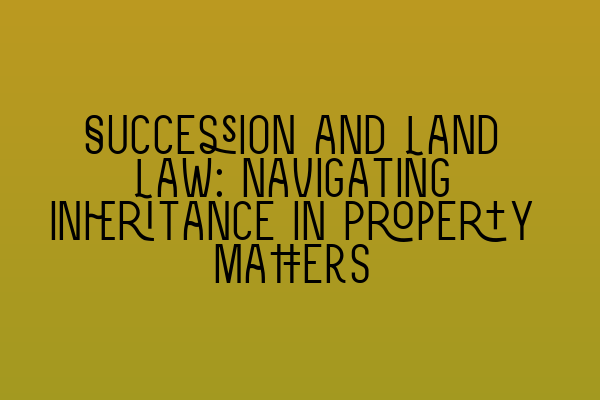Succession and Land Law: Navigating Inheritance in Property Matters
When it comes to property matters, succession and land law play a crucial role, especially in cases where inheritance is involved. Understanding the legal intricacies of succession and how they intertwine with land law is essential for anyone dealing with inheritance and property matters. In this article, we will delve into the fundamentals of succession and provide valuable insights for navigating inheritance in property matters.
What is Succession?
Succession refers to the transfer of property, rights, and obligations from one person to another upon their death. It is a fundamental principle of property law that ensures the smooth transition of assets and ownership. Succession laws vary from country to country, but they generally outline the rules for distributing property among heirs, whether through a will or intestacy (when there is no valid will).
In the United Kingdom, the laws governing succession are primarily governed by the Succession Act 1925, which sets out the rules and regulations for distributing the deceased’s estate. Additionally, the concept of inheritance tax comes into play, assessing the tax liability on the estate being passed on to the beneficiaries.
Succession and Land Law
Land law, on the other hand, deals with the legal rights associated with land and properties. It covers various aspects of property ownership, including the acquisition, transfer, and disposal of land. In the context of succession, land law determines how the deceased’s property is distributed and transferred to the rightful heirs.
One crucial aspect of succession and land law is determining the ownership of the property. If the deceased owned the property solely, it becomes part of their estate and is subject to succession laws. However, if the property is jointly owned, the surviving co-owner’s legal rights may be different, depending on the type of joint ownership (e.g., joint tenants or tenants-in-common).
When it comes to inherited property, the applicable laws and regulations may vary depending on the jurisdiction and specific circumstances. In some cases, the transfer of property through succession may be subject to certain conditions, such as the payment of inheritance tax or the fulfillment of legal requirements for transferring ownership.
Navigating Inheritance in Property Matters
Navigating inheritance in property matters can be a complex and challenging process, requiring a comprehensive understanding of both succession and land law. Whether you are an heir, executor, or a legal professional handling inheritance cases, having the right knowledge is crucial to ensure a smooth transition of property ownership.
One of the first steps in navigating inheritance is determining whether there is a valid will. If the deceased left a will, it typically specifies how their assets should be distributed among the beneficiaries. However, if there is no will, the laws of intestacy come into play, and the distribution of the deceased’s estate follows a predetermined order of priority set by the succession laws.
In either case, seeking legal advice is highly recommended to ensure compliance with the relevant laws and to navigate any potential disputes or complications that may arise during the inheritance process. A qualified solicitor specializing in property law and succession can provide valuable guidance and support throughout the entire process.
Conclusion
Succession and land law are intricately connected in matters of inheritance, especially when it comes to property. Understanding the legal principles and regulations governing succession is crucial for anyone involved in the transfer of property ownership upon the death of a loved one. Navigating inheritance in property matters requires careful consideration of the applicable laws, potential tax implications, and the complexity of joint ownership or estate distribution. By seeking advice from qualified professionals and staying informed about relevant legal developments, you can ensure a smooth and successful transition of property ownership.
If you would like to learn more about related topics, we have a range of articles available on our website:
